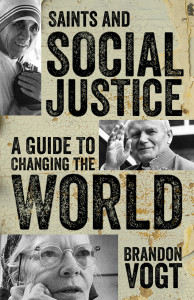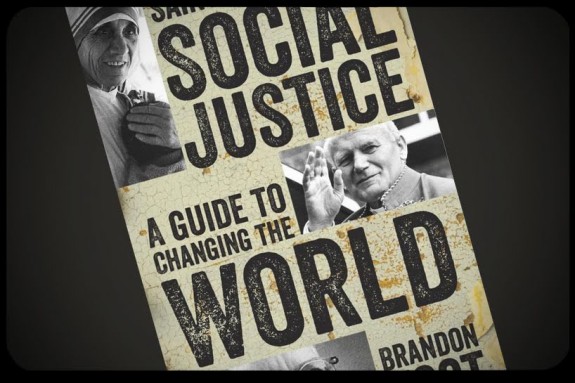My good friend Matt Becklo recently interviewed me at Aleteia about Saints and Social Justice (now available in paperback!).
You can read the whole interview here but I’ve posted an excerpt below.
Conservative commentator Glenn Beck once told his listeners: “Look for the words ‘social justice’ or ‘economic justice’ on your church website. If you find it, run as fast as you can.”
But as Brandon Vogt notes in his new book Saints and Social Justice: A Guide to Changing the World, the Vatican’s website uses these terms “no less than 115 times” — and he’s not running anywhere.
Using the lives of the saints as models, Saints and Social Justice is a timely unveiling and unleashing of the Catholic Church’s treasure trove of social teaching. Vogt gives us accessible, tangible examples of lives spent helping the poor and vulnerable, defending workers and families, and caring for the environment, all grounded in a deeper, more coherent, and more radical conception of justice than that offered by any one political platform today.
I recently spoke with Vogt to learn more about this important book, and about what we all can do to help change the world.
BECKLO: “Depending on who you talk with,” you write, “Catholic social teaching is either too liberal, too conservative, too outdated, too modern, too idealistic, too political, or in some cases all of the above.” What is Catholic teaching on social justice, and why is it so hard to box-in politically?
 VOGT: I prefer the pithy definition given by Dorothy Day and Peter Maurin: Catholic social teaching outlines a society in which it is “easier to be good.” It doesn’t neatly align with any political party or ideology because Christ doesn’t. This means the political left recoils when Catholic social teaching promotes the dignity of life, and in turn denounces abortion, euthanasia, and redefining marriage. But it generates flak on the right when it advocates care for creation, a special concern for the poor, and the right to strike and form labor unions. The Church’s social teaching rankles every political party because while political, it’s decidedly non-partisan. In short, it’s Catholic.
VOGT: I prefer the pithy definition given by Dorothy Day and Peter Maurin: Catholic social teaching outlines a society in which it is “easier to be good.” It doesn’t neatly align with any political party or ideology because Christ doesn’t. This means the political left recoils when Catholic social teaching promotes the dignity of life, and in turn denounces abortion, euthanasia, and redefining marriage. But it generates flak on the right when it advocates care for creation, a special concern for the poor, and the right to strike and form labor unions. The Church’s social teaching rankles every political party because while political, it’s decidedly non-partisan. In short, it’s Catholic.
BECKLO: Another “either/or” this book obliterates is the division of body and soul, something the modern world has wrestled with since Descartes. All of these saints practice a more holistic approach to the human person, embodying what the Church calls both “corporal” and “spiritual” acts of mercy. Why are the needs of both body and soul important to social justice? Why not just one or the other?
VOGT: To encourage justice means “to put into right relationship”, so social justice entails bringing groups of people into right relationship. But people are composed of both body and soul, as you note. They don’t just have physical needs. They also need spiritual aid. You can’t do justice without a concern for the whole person, body and soul. St. James picked up on this: “If a brother or sister has nothing to wear and has no food for the day, and one of you says to them, ‘Go in peace, keep warm, and eat well,’ but you do not give them the necessities of the body, what good is it?” (Js 2:15-16). And he was only building on the words of Christ: “Man does not live on bread alone” (Mt 4:4). During my research I discovered that every saint got this, without exception. They knew it wasn’t enough to offer prayers without tangible help, or food without spiritual nourishment. People need both.
Read the rest of the interview here.

